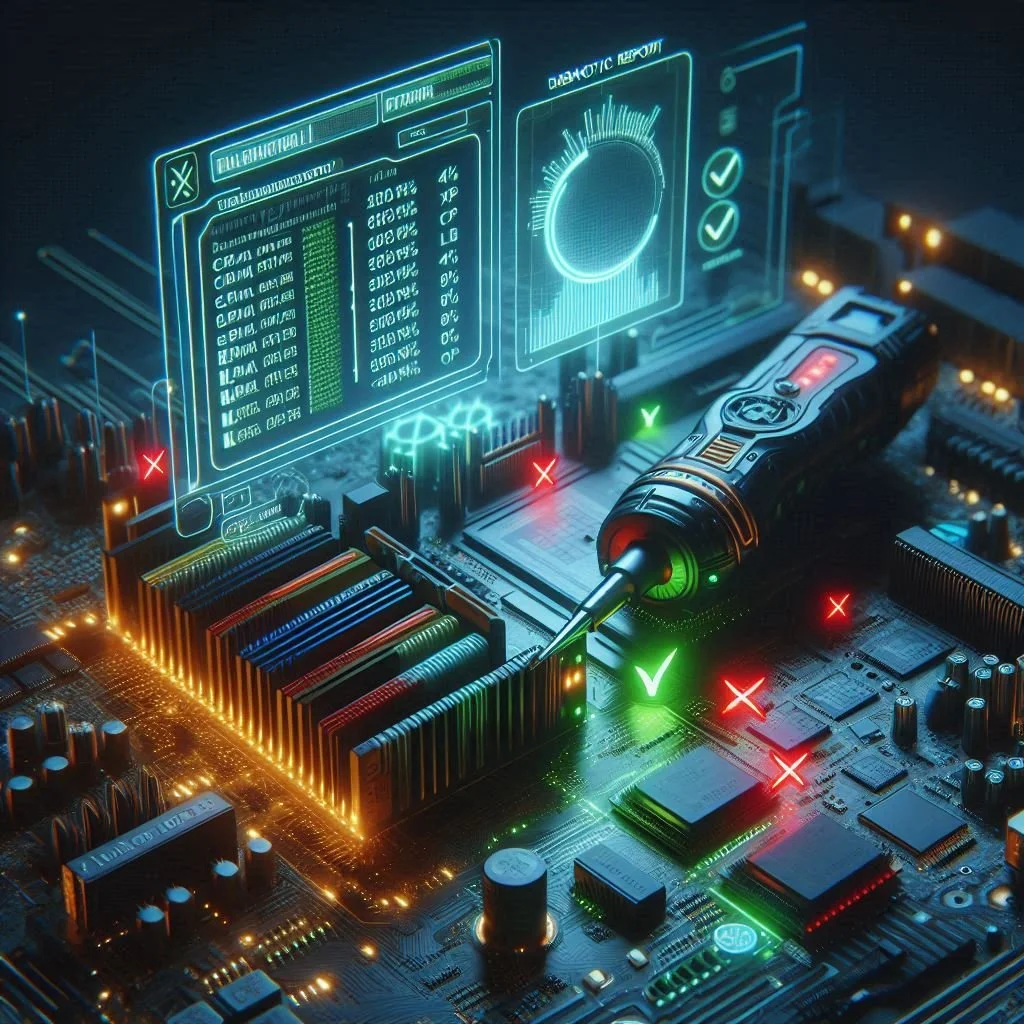 Image 1 of 1
Image 1 of 1


Hardware Diagnostics + Troubleshooting
🔍 Byte Bunker: Hardware Diagnostics + Troubleshooting
🧠 Initial Assessment & Issue Mapping
Conduct a full system check to identify symptoms (e.g. freezing, BSOD, slow boot, overheating)
Interview the user to understand usage patterns and recent changes
Map out potential root causes across hardware, drivers, and firmware
🧪 Component-Level Diagnostics
CPU: Check for thermal throttling, voltage irregularities, and core performance
GPU: Run stress tests, check VRAM integrity, and monitor rendering stability
RAM: Use tools like MemTest86 to detect faulty memory blocks
Storage: Scan SSD/HDD for bad sectors, SMART health, and read/write speeds
Motherboard: Inspect for capacitor damage, BIOS issues, and chipset faults
PSU: Test voltage output and stability under load
Cooling System: Evaluate fan RPM, airflow, and thermal paste condition
🧰 Troubleshooting & Fixes
Resolve POST errors and BIOS misconfigurations
Re-seat or replace faulty components (RAM sticks, GPU, cables)
Update or roll back drivers and firmware causing instability
Address power delivery issues and grounding faults
Fix peripheral connectivity problems (USB, audio, display ports)
🛡️ Security-Aware Hardware Checks
Scan for firmware-level malware or rootkits
Ensure TPM and secure boot configurations are intact
Validate BIOS integrity and lock critical settings
📈 Performance Benchmarking
Run pre/post diagnostics using tools like Cinebench, CrystalDiskMark, and FurMark
Provide visual reports comparing baseline vs optimized performance
Recommend upgrade paths based on bottlenecks and user goals
🧩 User Education & Maintenance Tips
Teach clients how to monitor temps, fan speeds, and system health
Share best practices for dust management and surge protection
Offer guidance on safe overclocking and BIOS updates
This service is all about precision, resilience, and proactive defense—just like Byte Bunker’s ethos.
🔍 Byte Bunker: Hardware Diagnostics + Troubleshooting
🧠 Initial Assessment & Issue Mapping
Conduct a full system check to identify symptoms (e.g. freezing, BSOD, slow boot, overheating)
Interview the user to understand usage patterns and recent changes
Map out potential root causes across hardware, drivers, and firmware
🧪 Component-Level Diagnostics
CPU: Check for thermal throttling, voltage irregularities, and core performance
GPU: Run stress tests, check VRAM integrity, and monitor rendering stability
RAM: Use tools like MemTest86 to detect faulty memory blocks
Storage: Scan SSD/HDD for bad sectors, SMART health, and read/write speeds
Motherboard: Inspect for capacitor damage, BIOS issues, and chipset faults
PSU: Test voltage output and stability under load
Cooling System: Evaluate fan RPM, airflow, and thermal paste condition
🧰 Troubleshooting & Fixes
Resolve POST errors and BIOS misconfigurations
Re-seat or replace faulty components (RAM sticks, GPU, cables)
Update or roll back drivers and firmware causing instability
Address power delivery issues and grounding faults
Fix peripheral connectivity problems (USB, audio, display ports)
🛡️ Security-Aware Hardware Checks
Scan for firmware-level malware or rootkits
Ensure TPM and secure boot configurations are intact
Validate BIOS integrity and lock critical settings
📈 Performance Benchmarking
Run pre/post diagnostics using tools like Cinebench, CrystalDiskMark, and FurMark
Provide visual reports comparing baseline vs optimized performance
Recommend upgrade paths based on bottlenecks and user goals
🧩 User Education & Maintenance Tips
Teach clients how to monitor temps, fan speeds, and system health
Share best practices for dust management and surge protection
Offer guidance on safe overclocking and BIOS updates
This service is all about precision, resilience, and proactive defense—just like Byte Bunker’s ethos.